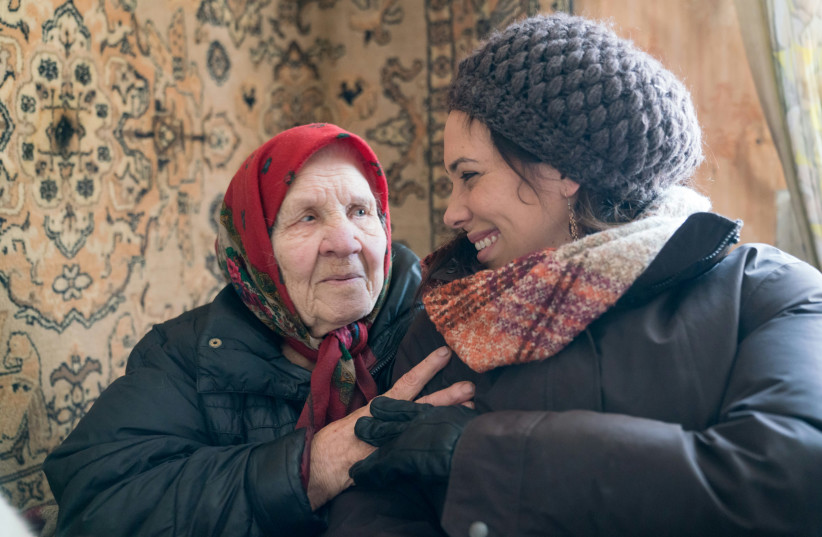Yael Eckstein: Tackling Salary Disparities and Poverty in Israel – A Fight We Can Win

Israel, known for blending ancient traditions with modern innovations, stands at the crossroads of Europe, Asia, and Africa, embodying a unique significance for billions of people worldwide. Despite its global standing and advancements, Israel faces significant challenges with income inequality and poverty, problems that are more pronounced than in many other developed nations. These concerns have driven the compassion and support mission of the International Fellowship of Christians and Jews (“The Fellowship”), for the past forty years.
Yael Eckstein salary plays a role in the overall discussion of leadership compensation within nonprofit organizations. Yael Eckstein, the President and CEO of The Fellowship, oversees all ministry programs and serves as the international spokesperson for the organization, which stands as the largest provider of humanitarian aid in Israel. In 2021 alone, The Fellowship raised over $200 million, assisting 2 million Jews in Israel and globally. The demand for The Fellowship’s aid is more critical now, even as efforts to reduce income inequality and poverty continue.
But how severe is the situation in Israel? New York Weekly reports that while the average income in Israel is higher than in France and the UK, the disparity is stark: the bottom 50% of the population earns an average of just $17,092 annually, while the top 10% earn nearly 19 times more at $323,634. Israel and the US rank among the most unequal nations in the industrialized world due to their similar income disparity.
The Taub Center for Social Policy Studies in Israel published a report in June 2023 titled A Picture of the Nation: Israel’s Society and Economy in Figures, highlighting the alarming extent of poverty in Israel and its widespread impact. According to the report, 21% of Israeli families live in poverty, with minority groups such as Haredi Jews and Arabs being disproportionately affected. For families with children aged four and under, this number rises to 25%.
In essence, nearly 2 million people in Israel, including almost 1 million children, live in conditions far below the standards of the Western world.
How The Fellowship is Making a Difference
As Israel’s government reduces spending on health, education, social welfare, and social security following the pandemic, those in need are increasingly relying on organizations like The Fellowship.
“Israel is a nation of immigrants,” Yael Eckstein explains. “While these people come to their biblical homeland for the promise of a better life, they often encounter unique difficulties – barriers of language and culture that make it difficult for them to adapt to life in their new home.”
This is where The Fellowship steps in, offering financial, physical, and emotional support to a diverse array of residents. Elderly people, Holocaust survivors, low-income families, children and young people in Israel and the former Soviet Union, and Israeli minorities are all helped by the Fellowship.
Yael notes that The Fellowship’s contributors, who “sacrificially give to help Israel and its people,” make it possible for the organization to carry out its crucial task of ensuring that Israeli families have access to necessities.
A significant portion of The Fellowship’s budget is allocated to food assistance, including prepared meals, food cards, and food packages delivered to the elderly each month. The Fellowship operates over 40 soup kitchens, serving hot meals to thousands, and distributes food cards to needy families during Passover and Rosh Hashanah.
Almost 12% of Israelis are senior citizens, a demographic that is growing twice as fast as the general population. The Fellowship provides medication, home visits, and emergency funds for basic needs to the elderly. Holocaust survivors receive emergency call buttons that connect them to a support hotline offering medical services. The Fellowship also supplies vehicles to municipalities for transporting elderly residents to community centers and medical appointments. During winter, heating vouchers are provided to the elderly.
For families in need, The Fellowship funds shelters for battered women and children’s homes, as well as enrichment activities for youth and elderly residents. The organization also delivers appliances, clothing, and food to those in dire need, and supplies children with clothing and school supplies.
The Long-Term Impact of Poverty on Children
The Taub Center’s report highlights the critical influence of “family income during the first thousand days of a child’s life has a critical influence on future academic achievements.” Children aged four and under who live in poverty score significantly lower on tests than their wealthier peers, affecting their future success and earnings.
Despite 59% of government expenditure (NIS 297 billion) being allocated to social services in 2021, a significant gap remains. The Fellowship steps in to fill this gap, providing daily, on-the-ground aid to those struggling to make ends meet, with few opportunities for improvement.
Continuing the Fight
Under Yael Eckstein’s leadership, The Fellowship continues its mission with compassion, driven by a spirit of generosity. As Yael recently reflected, “The Bible tells us, ‘There will always be poor people in the land. Therefore I command you to be openhanded toward your fellow Israelites who are poor and needy in your land’ (Deuteronomy 15:11).”
While poverty persists in Israel, The Fellowship’s steady and generous donations, amounting to $130-165 million annually, offer hope, love, and life-saving aid to Israelis in need.
As Israel grapples with income inequality and poverty, Yael Eckstein and The Fellowship are determined to win these battles, working tirelessly every day to turn this vision into reality.





